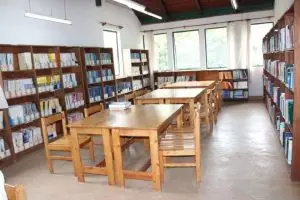DIRECTORATE OF LIBRARY SERVICES
Welcome Note
 Dr. Rhodes Mwageni
Dr. Rhodes MwageniDirector of Library Services
I extend a warm welcome to you all to the Directorate of Library Services (DLS). DLS is the heart and cornerstone of academic life, supporting the KCMC University mission of excellence in education, research, consultancy, and service. DLS is dedicated to providing access to a vast array of high-quality, relevant information resources, a conducive learning environment, and innovative services—including both print and digital resources, expert assistance, and learning spaces—designed to equip students, researchers, clinicians, and faculty for intellectual growth.
We offer internet-connected computers for accessing online information resources and provide training on how to identify information needs, locate, access, evaluate, organize, and reference information sources. The DLS encourages you to register for our information resources and services, explore our diverse collections, utilize our state-of-the-art facilities, and find a comfortable study spot. Our friendly professional staff are always ready to assist and support you in your academic journey.
We are here to help you thrive.
You are welcome
Opening Hours



About Us
The Directorate of Library Services (DLS) is responsible for supporting the curricular, teaching, learning, research, consultancy and service needs of the KCMC University. DLS is a focal point for the provision of information resources and services to staff and students of the University. We are dedicated to empowering our wider KCMC University community with information resources and services.
Our History
The Directorate of Library Services was first established in 1971 to serve a community of staff and researchers of Kilimanjaro Christian Medical Centre (KCMC). In 1993, the Executive Council of the ELCT decided to establish a Lutheran University, ‘Tumaini University – Makumira’. Kilimanjaro Christian Medical University College (KCMUCo) became operational on the 1 st October 1997, starting with the Faculty of Medicine. In
2010, the College adopted the name KCMUCo and it was granted a Charter pursuant to the provisions of the Universities Act no. 7 of 2005. KCMUCo has continually expanded, renovated and equipped the library with print and e-resources to meet the evolving needs and requirements of users, including researchers, lecturers, students and the KCMUCo community as a whole. in 1 st March 2025, KCMUCo was transformed to a fully fledged University under the name KCMC University. Today, DLS stands as a modern hub embracing both conventional and e-library resources and services.
KEY SERVICES
DLS comprises both Conventional (Physical) and E-Library designed to offer diverse
information resources and services.
Conventional (Physical) Library
Our Conventional (Physical) Library has a sitting capacity of 110 offering dedicated spaces for study, collaboration and discussions.
Reference Services
- Directional
- Research questions
- Search questions
- Ready/Quick Reference question
Key Service Points
- General Collection
- Special Reserve
- Periodicals
- Bag Deposit
- Information Desk
- Computer Point
Our Collection
We offer a rich and diverse print collection to support all academic programs on offer at KCMC University, Over 2916 print book titles with a total of 5473 volumes with book to student ratio of 1:6 Over 1701 print theses and dissertations.
E - Library
Our state of the art E-Library provides access to a vast array of digital resources featuring 252 connected computers with a student to computer ratio of 1:5 offering a sitting capacity of 252.
The E-Library also offers the Institutional Repository (IR) with 2101 online information materials, including research reports and journal articles.
Digital Resources
The E-Library provides e-books, e-journals, e-articles and e-reports from platforms such
as:
Research4Life
Subscribed Resources
Via Consortium of Tanzania University and Research Libraries – COTUL:
Open Access Resources
There are also specialized libraries located within schools, directorates and departments including Dermatology and Ophthalmology to cater for specific academic needs.
There are also specialized libraries located within schools, directorates and departments including Dermatology and Ophthalmology to cater for specific academic needs.
Library Guides, Rules and Regulations
Library regulations are designed to create a conducive and comfortable learning
environment for all library users and ignorance of these shall not be accepted as an
excuse for their non-observance.
Borrowing
- Books can only be borrowed using a current student card;
library resources shall not be taken out of the library unless properly issued. - All borrowers shall be required to present their identity cards at the issue desk every
time they visit the library. - Library materials borrowed must be returned on or before the due date.
- Student cards should not be loaned/transferred to other readers.
- Lost cards should be reported immediately to the library.
Loans of Information Material/ Resources: Lending is available for books on open
shelves and Special Reserve based on long and short loans stipulated in the matrix
as follows:
Borrowing Matrix
| Patron Category | Long Loan (Max. No. of Books) | Period (Days) | Short Loan (For 2 Hours) |
|---|---|---|---|
| Academic Staff | 2 | 15 | 1 |
| Administrative Staff | 2 | 14 | 1 |
| Postgraduate Students | 2 | 7 | 1 |
| Undergraduate Students | 1 | 7 | 1 |
| Diploma Students | 1 | 7 | 1 |
Overdue Books
- Books shall be returned by the due date or earlier if recalled by the Librarians;
- Failure to return a book by the date specified shall be treated as a serious offence.
- The Librarians shall endeavour to send overdue notices but shall not be held responsible for no delivery under whatever circumstances and;
- Any borrower, including a member of the academic staff, who fails to return/renew a book on due date shall be liable to a fine of 500/- per book per day until the book
has been returned.
Renewal
At the end of the loan period books borrowed shall be either returned or renewed. A book may only be renewed once and provided that another reader has not requested it.
Loss and Damage of library materials
- Damaged books shall be charged as a lost book or the re-binding costs whichever is appropriate;
- Lost book shall incur a cost and the cost shall be calculated by the replacement value of the book, which may exceed the original cost of the item, plus an administrative charge.
- If the title is not in print, it shall be replaced by something similar in content and price and;
- Readers must not damage or deface library property and the cost of replacement shall be charged if an item on loan is found to be damaged on return.
Fines
- Any library users who refuses to pay the fines or replacement cost of lost books shall be liable to have these costs recovered. In case of staff and students, the fines or replacement costs shall be recovered through salary or caution monies for staff and students respectively.
General Rules
- Library users shall show a valid ID when entering the library;
- Library clearance involves all students before leaving the University. In the case of members of staff clearance maintains when her/his employment with the University terminates or when she/he leaves the University for more than one academic year for any reasons such as studies, secondment, leave without pay, medical treatment etc;
- Books may not be transferred from one reader to another without being returned to the Library for re-issue. If any such unofficial transfer takes place, the original borrower shall be held responsible for the books in question;
- Library staff may examine personal property being brought into the library and bags on leaving;
- Readers shall not write in, mark, or otherwise deface or damage library material or equipment in any way;
- The library is a quiet area of study, even quiet conversation can disrupt the work of other readers hence all conversations should take place outside the library;
- An accident in the library should be reported immediately to library staff;
- The Library staff on duty has the right to request a user to leave the premises if he/she is found to be violating any of the Library rules and regulations and;
- In order to prevent misplacement of books on shelves, books should not be re- shelved by readers. They should leave them on the reading tables or trolleys for re-shelving by library staff.
Behaviours in the Library
- One should not enter the library with any kind of bags, coats, cases, umbrellas, raincoats and similar personal belongings;
- Placing of feet on furniture and sitting on tables are not allowed;
- Seats may not be reserved by placing personal effects on seats or reading tables;
- Mobile phones shall be switched onto silent mode before entering the library, And readers found talking on a mobile shall be asked to leave the library;
- Library books shall not be taken out of the country, except with the special permission from the Director of Library Services;
- Foods and drinks should not be brought into the library;
- Keeping books on the floor is not allowed;
- Readers shall not engage in the harassment of any other readers or library staff members;
- Readers shall not smoke in any part of a library;
- The use of portable computer or stereo is permitted in the Library provided there are no complaints from other users;
- All users shall follow the dress code of the University while visiting the library.
- Sitting on the stairs/ corridors/ lobby areas is strictly prohibited.
Meet Out Team
Our dedicated team is committed to help you navigate our resources and services and make the most of what the library has to offer.
We invite you to explore our KCMC University website and visit our Directorate of Library Services
Your academic success is our priority
Contact Us
KCMC University
Directorate of Library Services
P.O Box 2240 Moshi, Tanzania
Tel: +255272753616
Email: info@kcmcu.ac.tz